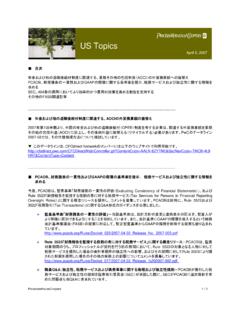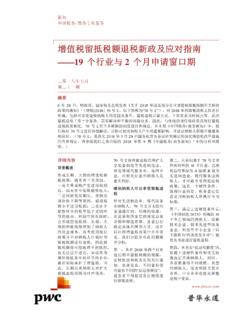Transcription of Tribunal rejects sale consideration as per SPA ... - …
1 Tax Insights from India Tax & Regulatory Services Tribunal rejects sale consideration as per SPA; considers FMV determined as per binding contractual obligation between the parties December 10, 2017 In brief In a recent ruling1, the Delhi Bench of Income-tax Appellate Tribunal ( Tribunal ) held that the sale consideration as shown by the taxpayer was not in consonance with the contractual obligations entered by the parties under various framework agreements. The framework agreements envisaged that the sale consideration was linked with the Fair Market Value (FMV) of underlying assets. In detail Facts The taxpayer held shares in S Limited. S Limited further through its intermediaries held shares in B Limited earlier known as C Limited.
2 The taxpayer sold all the shares (41% which included original as well as the right shares) in financial year 2013-14, which was further to the liberalisation of foreign direct investment regime for telecom sector in India. The taxpayer offered the same to tax in accordance with the provisions of section 45 read with section 48 of the Income-tax Act, 1961 (the Act). The Tax Officer (TO), held that the taxpayer indirectly held shareholding in B Limited at through chain of 1 ITA No. 4737/Del/2017 intermediaries from S Limited to B Limited and the valuation of B Limited adopted by the valuer. The TO adopted the FMV of the S Limited shares by invoking the provision of section 50D of the Act.
3 The Commissioner of Income-tax (Appeals) [CIT(A)] confirmed the action on the ground that the TO was justified in invoking section 50D of the Act. The taxpayer filed an appeal before the Tribunal against the order of the CIT(A). Amongst other grounds, the major issue before the Tribunal was that the CIT(A) erred on facts and in law in re-computing the amount of capital gain arising from the sale of shares of S Limited by substituting the actual sales consideration with the alleged FMV invoking section 50D of the Act. Key issues before the Tribunal Whether the provisions of section 50D can be invoked on the facts of the present case to justify the adoption of FMV of shares of S Limited. Whether the TO or the CIT(A) were justified in enhancing the sale consideration and consequently, enhancing the amount of capital gains declared by the taxpayer.
4 Whether such enhancement can be said to have been accrued to the taxpayer in terms of section 48 of the Act. Tax Insights PwC Page 2 Taxpayer s contentions If the Revenue alleges that the taxpayer received an amount in excess of the declared consideration , then the onus was on the Revenue to demonstrate that excess consideration had been received by the taxpayer. Section 50D does not empower the TO to substitute the actual consideration that has been passed between the parties with any hypothetical or notional consideration or FMV of the assets. The consideration was independently negotiated and agreed to by the parties. The valuation report obtained from the valuer was only a confirmation that the price agreed between the parties was not below the minimum threshold in terms of the applicable government/ foreign exchange regulations and that the same was not the basis for arriving at the sales consideration .
5 The actual consideration received by the taxpayer should have been regarded as the sale consideration on transfer of shares and no addition was warranted, as the Revenue had purely on surmises, suspicions and conjectures averred that for computing capital gains on sale of shares of S Limited some higher consideration needs to be substituted in place of the declared consideration , without making an attempt to quantify such alleged higher consideration . Revenue s contentions The valuer valued shares of C Limited under the DCF method while they adopted the net asset value (NAV) method to value shares of S Limited which was not in line with the valuation prescribed under Rule 11UA. The valuer s report stated a caveat, which explicitly brings out material weaknesses in the assumptions and the final value of shares arrived.
6 It was not a simple case of purchase and sale of a capital asset. In the present case, the taxpayer held the shares in S Limited for the benefit of F group primarily to beat the foreign equity cap for which the appellant was paid call option fee for holding the shares and with a stipulation that the shares would be transferred to F group once the cap was lifted at a pre-agreed price. The price as agreed between the parties was linked to the FMV of shares of C Limited/ B Limited as per the Framework Agreements of 2006 and 2007. This was not a hypothetical price or notional value, which the TO took into account, but the price that was originally agreed as per the Framework Agreement of 2006 and the same basis continued in the Framework Agreement of 2007, with some modification in the mode of working.
7 When a certain price for shares under the call/ put option was agreed to between the parties and the rights and obligations had accrued to the parties, it was not necessary to enter into a fresh share purchase agreement (SPA), which puts an arbitrary figure for the right shares and original shares without specifying any basis whatsoever how these figures have been arrived at or what was the reason for the deviation from the prices agreed to. The consideration agreed between the parties was always linked with the FMV of the shares of C Limited/ B Limited. The price agreed between the parties was a vested right of the taxpayer and could not be given a complete go by only on the basis of the SPA entered into on 12 March 2014 before the transfer (on 21 March 2014) particularly when the taxpayer had no explanation whatsoever for the departure from the existing agreement, which had already created such rights in his favour.
8 That the consideration accrued as a result of transfer of right shares that could not be determined independent of the original shares and to that extent the provisions of section 50D would get attracted. Tribunal s decision Section 50D had no application in the present case for the reason that if section 50D could have applied for substituting the actual consideration of the FMV in a situation similar to that of the taxpayer, there was no reason for the legislature to introduce section 50CA through the Finance Act, 2017. Under the Framework Agreement of 2006, the value of the share capital of S Limited was agreed at of the value of shares of C Limited and the liability of the intermediary companies was not to be recognised for working out the sale consideration .
9 In the Framework Agreement of 2007, the sale consideration was stipulated. In the working provided for computing FMV of S Limited, there were ad-hoc discounts, such as discounts on account of Tax Insights PwC Page 3 holding companies, liquidity discount on local shares for which no basis had been provided, the share value had been worked out to match the sale consideration of S Limited. In the valuation report while determining the share value of S Limited, the valuer had adopted hybrid method, , DCF method for B Limited and NAV for intermediary companies which does not find any support under the Rule 11UA. In terms of section 48, what was accrued to the taxpayer on the transfer of the unquoted shares of S Limited, was that which was determinable on the basis of the FMV of C Limited/ B Limited.
10 Thus, the consideration accrued to the taxpayer as per the share purchase agreement was not accepted. The sale value of S Limited as shown by the taxpayer was not in consonance with the contractual obligations entered into by the parties under various Framework Agreements, wherein it had been repeatedly envisaged that the value of S Limited was linked with the FMV of C Limited/ B Limited, and therefore, the share value as re-worked by the TO was upheld. The takeaways This decision once again highlights that an arrangement between the parties would be looked at in entirety for determining their understanding for tax purposes. Let s talk For a deeper discussion of how this issue might affect your business, please contact your local PwC advisor Tax Insights For private circulation only This publication has been prepared for general guidance on matters of interest only, and does not constitute professional advice.












